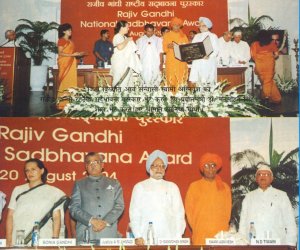
RAJIV GANDHI NATIONAL SADBHAVANA AWARD - 2004 CITATION Swami Agnivesh Every society has a few exceptional persons as its conscience - keepers. With piercing eyes they perceive the injustices committed and with impassioned accents they rally their fellowmen to fight against evil. One such outstanding concience-keeper of our country is Swami Agnivesh. He has been rightly described as a global firebrand for humanism. There is no endeavour to enlarge social justice within the country and in the wider world in which he is not in the forefront, be it the ending of bonded labour and child labour of all kinds, or the enforcement of equal rights for women. He has been an eloquent champion of the poorer peoples rights in this age of rapid globalisation and also of environmental protection. But above all it is in the fight against religious fundamentalism and the growth of communal hatred that Swami Agnivesh has made his greatest contribution. The marches he organized at the time of the Sati incident in Rajasthan in 1987 and to have the doors of Nathdwara temple opened to Dalits in 1988, the Delhi - Meerut peace march of 1989 and the march of 51 leaders of various denominations to Manoharpur in 1999 to offer sympathy to Mrs. Gladys Staines after her husband had been killed by fanatics, and the way he countered the communal forces in Gujarat in 2002 have all evoked widespread admiration. Swami Agnivesh deplores the fact that religions have allowed themselves to be politically exploited. Instead of nurturing and enabling our humanity, religions have unleashed hatred and violence. In his view the very idea of religion needs to be reconstructed with spirituality and social justice at its core. It is in recognition of his dedicated and tireless work to remove the seeds of hate form our land that this extraordinary man of religion, Swami Agnivesh, is being honoured with this year's Rajiv Gandhi National Sadbhavana Award. Swami Agnivesh is a unique personality of our times. He exemplifies our national ethos in his quest of a deeper faith. He has said: "One of the foremost needs in the Indian context today is in reform the very idea or religion." He despairs at the gradual depletion of spirituality in our religious and has expressed his anguish and pain at the erosion of ethics in our society and polity. I share Agniveshji's view tha "men of religion" msut "play a more positive role in politics, and imbue in it the values that nourish public culture and the art of governance." It recalls the views of Swami Vivekananda, of whom we cannot but think when we see Agniveshji, who sought to build his movement for national regeneration and reconstruction on the foundation of deeply spiritual values, and not bigotry, religious fanaticism or casteism. Agniveshji's relentless fight for the poor and deprived sections of society, his crusade against alcoholism, female foeticide, bonded labour and child labour, his struggle for gender equality and justice and above all, his campaign against vulgar consumerism and environmental degradation are manifestations of his creative application of religion to the problems of our time. Dr. Manmohan Singh, Prime Minister, India